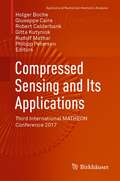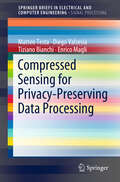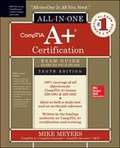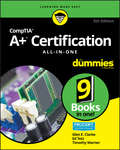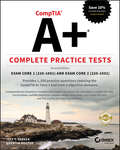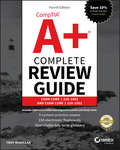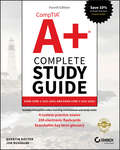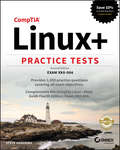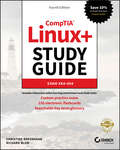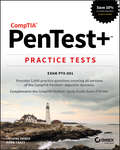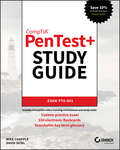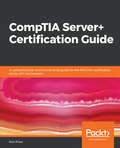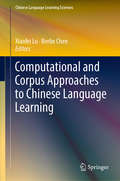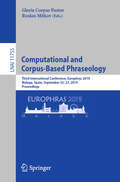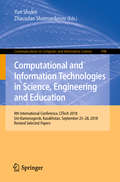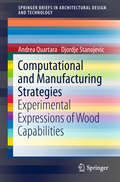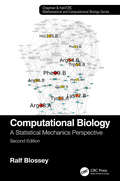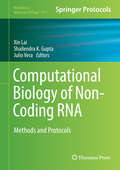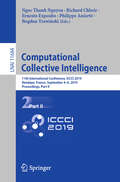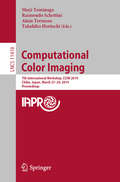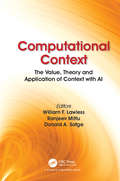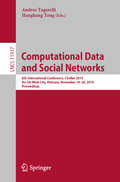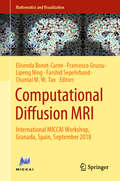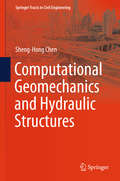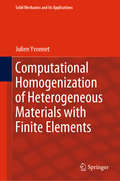- Table View
- List View
Compressed Sensing and Its Applications: Third International MATHEON Conference 2017 (Applied and Numerical Harmonic Analysis)
by Holger Boche Giuseppe Caire Robert Calderbank Gitta Kutyniok Rudolf Mathar Philipp PetersenThe chapters in this volume highlight the state-of-the-art of compressed sensing and are based on talks given at the third international MATHEON conference on the same topic, held from December 4-8, 2017 at the Technical University in Berlin. In addition to methods in compressed sensing, chapters provide insights into cutting edge applications of deep learning in data science, highlighting the overlapping ideas and methods that connect the fields of compressed sensing and deep learning. Specific topics covered include:Quantized compressed sensingClassificationMachine learningOracle inequalitiesNon-convex optimizationImage reconstructionStatistical learning theoryThis volume will be a valuable resource for graduate students and researchers in the areas of mathematics, computer science, and engineering, as well as other applied scientists exploring potential applications of compressed sensing.
Compressed Sensing for Privacy-Preserving Data Processing (SpringerBriefs in Electrical and Computer Engineering)
by Matteo Testa Diego Valsesia Tiziano Bianchi Enrico MagliThe objective of this book is to provide the reader with a comprehensive survey of the topic compressed sensing in information retrieval and signal detection with privacy preserving functionality without compromising the performance of the embedding in terms of accuracy or computational efficiency. The reader is guided in exploring the topic by first establishing a shared knowledge about compressed sensing and how it is used nowadays. Then, clear models and definitions for its use as a cryptosystem and a privacy-preserving embedding are laid down, before tackling state-of-the-art results for both applications. The reader will conclude the book having learned that the current results in terms of security of compressed techniques allow it to be a very promising solution to many practical problems of interest. The book caters to a broad audience among researchers, scientists, or engineers with very diverse backgrounds, having interests in security, cryptography and privacy in information retrieval systems. Accompanying software is made available on the authors’ website to reproduce the experiments and techniques presented in the book. The only background required to the reader is a good knowledge of linear algebra, probability and information theory.
CompTIA A+ Certification All-in-One Exam Guide: Exams 220-1001 & 220-1002
by Mike MeyersThis bestselling on-the-job reference and test preparation guide has been fully revised for the new 2019 CompTIA Core 1 and Core 2 CompTIA A+ exam objectives <p><p> This fully revised and updated resource offers complete coverage of the latest release of CompTIA A+ exams 220-1001 & 220-1002. You'll find learning objectives at the beginning of each chapter, exam tips, practice exam questions, and in-depth explanations. Designed to help you pass the CompTIA A+ exams with ease, this definitive guide also serves as an essential on-the-job IT reference.
CompTIA A+ Certification All-in-One For Dummies
by Glen E. Clarke Edward Tetz Timothy L. WarnerFully updated to cover the 2019 exam release! CompTIA's A+ certification is an essential certification to building a successful IT career. Test takers must pass both 90-question exams to be certified, and this book—plus online test bank—will help you reach your certification goal. The 9 minibooks map to the exam's objectives, and include new content on Windows 10, Scripting, Linux, and mobile devices. You’ll learn about how computers work, networking, computer repair and troubleshooting, security, permissions, and customer service. You'll also find test-taking advice and a review of the types of questions you'll see on the exam. Use the online test bank to test your knowledge and prepare for the exam Get up to speed on operating system basics Find out how to manage the operating system Discover maintenance and troubleshooting tips Inside is all the knowledge you need to pass the new A+ exam!
CompTIA A+ Complete Practice Tests: Exam Core 1 220-1001 and Exam Core 2 220-1002
by Quentin Docter Jeff T. ParkerTest your knowledge and know what to expect on A+ exam day CompTIA A+ Complete Practice Tests, Second Edition enables you to hone your test-taking skills, focus on challenging areas, and be thoroughly prepared to ace the exam and earn your A+ certification. This essential component of your overall study plan presents nine unique practice tests—and two 90-question bonus tests—covering 100% of the objective domains for both the 220-1001 and 220-1002 exams. Comprehensive coverage of every essential exam topic ensures that you will know what to expect on exam day and maximize your chances for success. Over 1200 practice questions on topics including hardware, networking, mobile devices, operating systems and procedures, troubleshooting, and more, lets you assess your performance and gain the confidence you need to pass the exam with flying colors. This second edition has been fully updated to reflect the latest best practices and updated exam objectives you will see on the big day. A+ certification is a crucial step in your IT career. Many businesses require this accreditation when hiring computer technicians or validating the skills of current employees. This collection of practice tests allows you to: Access the test bank in the Sybex interactive learning environment Understand the subject matter through clear and accurate answers and explanations of exam objectives Evaluate your exam knowledge and concentrate on problem areas Integrate practice tests with other Sybex review and study guides, including the CompTIA A+ Complete Study Guide and the CompTIA A+ Complete Deluxe Study Guide Practice tests are an effective way to increase comprehension, strengthen retention, and measure overall knowledge. The CompTIA A+ Complete Practice Tests, Second Edition is an indispensable part of any study plan for A+ certification.
CompTIA A+ Complete Review Guide: Exam Core 1 220-1001 and Exam Core 2 220-1002
by Troy McMillanA comprehensive step-by-step review for A+ certification, revised for the latest exams The CompTIA A+ Complete Review Guide: Exam 220-1001 and Exam 220-1002, Fourth Edition is an ideal preparation tool to help you ace the exam and get certified. The must-have companion to the CompTIA A+ Complete Study Guide, this book provides a streamlined review of vital exam topics, helping you reinforce comprehension and strengthen retention. Now in its fourth edition, this review guide has been fully updated to focus on the latest best practices and new exam objectives. A clear and concise review structure helps you to focus on problem areas while logically organized topics allow for quick reference and flexible study. Covering both A+ exams, this book covers topics including PC hardware, networking, operating systems and procedures, security, troubleshooting, and more. Access to the Sybex online learning environment includes practice test questions, bonus exams, electronic flashcards, and a searchable glossary of key terms. Organize your exam prep to focus on challenging areas and reinforce your understanding of essential exam objectives. A+ certification is a vital step for careers in information technology, allowing current and prospective computer technicians to validate or recertify their skills. An essential component to any A+ exam strategy, this valuable review will help you: Learn to install and configure modern hardware and peripherals such as network switches, firewalls, and Bluetooth modules Keep updated on current software, including Windows, Linux, and mobile operating systems Integrate exam reviews with other Sybex learning resources to provide a comprehensive study plan The CompTIA A+ Complete Review Guide: Exam 220-1001 and Exam 220-1002, Fourth Edition is an integral part of your overall exam prep strategy, allowing you to focus your study on what matters most.
CompTIA A+ Complete Study Guide: Exam Core 1 220-1001 and Exam Core 2 220-1002
by Quentin Docter Jon BuhagiarThe definitive Sybex guide to A+ certification, fully updated for the latest exams The CompTIA A+ Complete Study Guide, Fourth Edition is your ultimate preparation guide for Exams 220-1001 and 220-1002. Covering 100 percent of the objectives for both exams, this book gets you up to speed on essential A+ knowledge and skills. Master the critical competencies associated with hardware and software, system maintenance, troubleshooting, connectivity, and more—with practical examples drawn from real-world experience, you’ll develop the skill set employers demand in today’s IT environment. End-of-chapter reviews help you gauge your progress and stay on track for success, while exam highlights give you a sneak preview of what to expect on the big day. You also get access to the Sybex online test bank, featuring electronic flashcards, a searchable glossary, and 4 practice exams to help you study from anywhere, any time—track your progress and test your understanding with interactive study tools. CompTIA A+ certification is the industry-leading standard for IT professionals. Hundreds of companies require their computer technicians to hold this valuable credential. Now in its fourth edition, this revised and updated study guide includes expanded coverage of virtualization and cloud computing, mobile hardware installation, network security, and more, to reflect the latest changes in the A+ exam. Providing all the information you need to earn your A+ certification, this invaluable resource will help you: Master the basics of hardware, software, and peripherals Understand and troubleshoot network connectivity issues Install and configure Windows, iOS, Android, Apple OSX, and Linux operating systems The CompTIA A+ Complete Study Guide, Fourth Edition arms you with the tools and knowledge necessary to take your skills to the next level. Whether a first-time candidate or IT professional in need of recertification, this essential study guide will help you prepare, practice, and pass with minimal burden and maximum results.
CompTIA Linux+ Practice Tests: Exam XK0-004
by Steve SuehringThe best practice test preparation for the foundational CompTIA Linux+ certification exam If you’re preparing for this all-important exam, turn to CompTIA Linux+ Practice Tests. The book covers the 5 objective domains, PLUS one additional 90-question practice exam, for a total of 1,000 practice test questions. Readers will also get one year of FREE access to the online test bank where they can study and work through the questions, reinforcing their skills and knowledge. Study for the CompTIA Linux+ certification with Sybex and get the advantage of exam day confidence. This book covers: Hardware and System Configuration Systems Operation and Maintenance Security Linux Troubleshooting and Diagnostics Automation and Scripting Linux is a UNIX-based operating system originally created by Linus Torvalds with the help of developers around the world. Developed under the GNU General Public License, the source code is free. Because of this, Linux is viewed by many organizations and companies as an excellent, low-cost, secure alternative to expensive OSs, such as Microsoft Windows. The CompTIA Linux+ exam tests a candidate's understanding and familiarity with the Linux Kernel. As the Linux server market share continues to grow, so too does demand for qualified and certified Linux administrators.
CompTIA Linux+ Study Guide: Exam XK0-004
by Richard Blum Christine BresnahanThe bestselling study guide completely updated for the NEW CompTIA Linux+ Exam XK0-004 This is your one-stop resource for complete coverage of Exam XK0-004, covering 100% of all exam objectives. You'll prepare for the exam smarter and faster with Sybex thanks to superior content including, assessment tests that check exam readiness, objective map, real-world scenarios, hands-on exercises, key topic exam essentials, and challenging chapter review questions. Linux is a UNIX-based operating system originally created by Linus Torvalds with the help of developers around the world. Developed under the GNU General Public License, the source code is free. Because of this Linux is viewed by many organizations and companies as an excellent, low-cost, secure alternative to expensive OSs, such as Microsoft Windows. The CompTIA Linux+ exam tests a candidate's understanding and familiarity with the Linux Kernel. As the Linux server market share continues to grow, so too does demand for qualified and certified Linux administrators. Building on the popular Sybex Study Guide approach, this book will provide 100% coverage of the NEW Linux+ Exam XK0-004 objectives. The book contains clear and concise information on all Linux administration topic, and includes practical examples and insights drawn from real-world experience. Hardware and System Configuration Systems Operation and Maintenance Security Linux Troubleshooting and Diagnostics Automation and Scripting You’ll also have access to an online test bank, including a bonus practice exam, electronic flashcards, and a searchable PDF of key terms.
CompTIA PenTest+ Practice Tests: Exam PT0-001
by Crystal Panek Robb TracyThe must-have test prep for the new CompTIA PenTest+ certification CompTIA PenTest+ is an intermediate-level cybersecurity certification that assesses second-generation penetration testing, vulnerability assessment, and vulnerability-management skills. These cognitive and hands-on skills are required worldwide to responsibly perform assessments of IT systems, identify weaknesses, manage the vulnerabilities, and determine if existing cybersecurity practices deviate from accepted practices, configurations and policies. Five unique 160-question practice tests Tests cover the five CompTIA PenTest+ objective domains Two additional 100-question practice exams A total of 1000 practice test questions This book helps you gain the confidence you need for taking the CompTIA PenTest+ Exam PT0-001. The practice test questions prepare you for test success.
CompTIA PenTest+ Study Guide: Exam PT0-001
by Mike Chapple David SeidlWorld-class preparation for the new PenTest+ exam The CompTIA PenTest+ Study Guide: Exam PT0-001 offers comprehensive preparation for the newest intermediate cybersecurity certification exam. With expert coverage of Exam PT0-001 objectives, this book is your ideal companion throughout all stages of study; whether you’re just embarking on your certification journey or finalizing preparations for the big day, this invaluable resource helps you solidify your understanding of essential skills and concepts. Access to the Sybex online learning environment allows you to study anytime, anywhere with electronic flashcards, a searchable glossary, and more, while hundreds of practice exam questions help you step up your preparations and avoid surprises on exam day. The CompTIA PenTest+ certification validates your skills and knowledge surrounding second-generation penetration testing, vulnerability assessment, and vulnerability management on a variety of systems and devices, making it the latest go-to qualification in an increasingly mobile world. This book contains everything you need to prepare; identify what you already know, learn what you don’t know, and face the exam with full confidence! Perform security assessments on desktops and mobile devices, as well as cloud, IoT, industrial and embedded systems Identify security weaknesses and manage system vulnerabilities Ensure that existing cybersecurity practices, configurations, and policies conform with current best practices Simulate cyberattacks to pinpoint security weaknesses in operating systems, networks, and applications As our information technology advances, so do the threats against it. It’s an arms race for complexity and sophistication, and the expansion of networked devices and the Internet of Things has integrated cybersecurity into nearly every aspect of our lives. The PenTest+ certification equips you with the skills you need to identify potential problems—and fix them—and the CompTIA PenTest+ Study Guide: Exam PT0-001 is the central component of a complete preparation plan.
CompTIA Server+: A comprehensive, end-to-end study guide for the SK0-004 certification, along with mock exams
by Ron PriceThis book is targeted towards professionals seeking to gain the CompTIA Server+ certification. People coming from a Microsoft background with basic operating system and networking skills will also find this book useful. Basic experience working with system administration is mandatory.
Computational and Corpus Approaches to Chinese Language Learning (Chinese Language Learning Sciences)
by Xiaofei Lu Berlin ChenThis book presents a collection of original research articles that showcase the state of the art of research in corpus and computational linguistic approaches to Chinese language teaching, learning and assessment. It offers a comprehensive set of corpus resources and natural language processing tools that are useful for teaching, learning and assessing Chinese as a second or foreign language; methods for implementing such resources and techniques in Chinese pedagogy and assessment; as well as research findings on the effectiveness of using such resources and techniques in various aspects of Chinese pedagogy and assessment.
Computational and Corpus-Based Phraseology: Third International Conference, Europhras 2019, Malaga, Spain, September 25–27, 2019, Proceedings (Lecture Notes in Computer Science #11755)
by Gloria Corpas Pastor Ruslan MitkovThis book constitutes the refereed proceedings of the Third International Conference on Computational and Corpus-Based Phraseology, Europhras 2019, held in Malaga, Spain, in September 2019.The 31 full papers presented in this book were carefully reviewed and selected from 116 submissions. The papers in this volume cover a number of topics including general corpus-based approaches to phraseology, phraseology in translation and cross-linguistic studies, phraseology in language teaching and learning, phraseology in specialized languages, phraseology in lexicography, cognitive approaches to phraseology, the computational treatment of multiword expressions, and the development, annotation, and exploitation of corpora for phraseological studies.
Computational and Information Technologies in Science, Engineering and Education: 9th International Conference, CITech 2018, Ust-Kamenogorsk, Kazakhstan, September 25-28, 2018, Revised Selected Papers (Communications in Computer and Information Science #998)
by Yuri Shokin Zhassulan ShaimardanovThis book constitutes the refereed proceedings of the 9th International Conference on Computational and Information Technologies in Science, Engineering and Education, CITech 2018, held in Ust-Kamenogorsk, Kazakhstan, in September 2018.The 25 revised full papers presented were carefully reviewed and selected from 64 submissions. The papers address issues such as mathematical and computer modeling, fundamental problems of mathematics, technological aspects of the applications of parallel computer systems, high level parallel programming languages and systems.
Computational and Manufacturing Strategies: Experimental Expressions Of Wood Capabilities (Springerbriefs In Architectural Design And Technology Ser.)
by Andrea Quartara Djordje StanojevicThis book highlights computationally enabled and digitally fabricated strategies used in the design of a series of full-size wooden structures. It introduces theoretical foundations and then focuses on the possibilities that have emerged as a result of the material-aware processes. The case studies expound wood as one of the most suitable materials to experience the seamless framework introduced with the digital design-to-construction chain. Two main aspects of the pavilions constructed, developed in various international academic groups, are considered. On one hand the case studies explore tolerances of raw and engineered material intertwined with machine processing; they also address material enhancement through strip applications in timber construction. In addition, the structures are examined in the light of an extensible designing path, which acts as an interoperable procedure, bridging the virtual and the real.
Computational Biology: A Statistical Mechanics Perspective, Second Edition (Chapman & Hall/CRC Computational Biology Series)
by Ralf BlosseyComputational biology has developed rapidly during the last two decades following the genomic revolution which culminated in the sequencing of the human genome. More than ever it has developed into a field which embraces computational methods from different branches of the exact sciences: pure and applied mathematics, computer science, theoretical physics. This Second Edition provides a solid introduction to the techniques of statistical mechanics for graduate students and researchers in computational biology and biophysics. Material has been reorganized to clarify equilbrium and nonequilibrium aspects of biomolecular systems Content has been expanded, in particular in the treatment of the electrostatic interactions of biomolecules and the application of non-equilibrium statistical mechanics to biomolecules New network-based approaches for the study of proteins are presented. All treated topics are put firmly in the context of the current research literature, allowing the reader to easily follow an individual path into a specific research field. Exercises and Tasks accompany the presentations of the topics with the intention of enabling the readers to test their comprehension of the developed basic concepts.
Computational Biology of Non-Coding RNA: Methods and Protocols (Methods in Molecular Biology #1912)
by Xin Lai Shailendra K. Gupta Julio VeraThis volume details a collection of state-of-art methods including identification of novel ncRNAs and their targets, functional annotation and disease association in different biological contexts. Chapters guide readers through an overview of disease-specific ncRNAs, computational methods and workflows for ncRNA discovery, annotation based on high-throughput sequencing data, bioinformatics tools and databases for ncRNA analyses, network-based methods, and kinetic modelling of ncRNA-mediated gene regulation. Written in the highly successful Methods in Molecular Biology series format, chapters include introductions to their respective topics, lists of the necessary materials and reagents, step-by-step, readily reproducible laboratory protocols, and tips on troubleshooting and avoiding known pitfalls. Authoritative and cutting-edge, Computational Biology of Non-Coding RNA: Methods and Protocols aims to provide a state-of-the-art collection of computational methods and approaches that will be of value to researchers interested in ncRNA field.
Computational Collective Intelligence: 11th International Conference, ICCCI 2019, Hendaye, France, September 4–6, 2019, Proceedings, Part II (Lecture Notes in Computer Science #11684)
by Ngoc Thanh Nguyen Richard Chbeir Ernesto Exposito Philippe Aniorté Bogdan TrawińskiThis two-volume set (LNAI 11683 and LNAI 11684) constitutes the refereed proceedings of the 11th International Conference on Computational Collective Intelligence, ICCCI 2019, held in Hendaye France, in September 2019.The 117 full papers presented were carefully reviewed and selected from 200 submissions. The papers are grouped in topical sections on: computational collective intelligence and natural language processing; machine learning in real-world data; distributed collective intelligence for smart manufacturing; collective intelligence for science and technology; intelligent management information systems; intelligent sustainable smart cities; new trends and challenges in education: the university 4.0; intelligent processing of multimedia in web systems; and big data streaming, applications and security.
Computational Color Imaging: 7th International Workshop, CCIW 2019, Chiba, Japan, March 27-29, 2019, Proceedings (Lecture Notes in Computer Science #11418)
by Shoji Tominaga Raimondo Schettini Alain Trémeau Takahiko HoriuchiThis book constitutes the refereed proceedings of the 7th Computational Color Imaging Workshop, CCIW 2019, held in Chiba, Japan, in March 2019.The 22 full papers presented in this volume were carefully reviewed and selected from 34 submissions. The papers are organized in topical sections named: computational color imaging; multispectral imaging; perceptual model and application; color image evaluation; colot image filtering; color image applications; and color imaging for material appearance. In addition, the book contains 3 invited talks in full paper length.
Computational Context: The Value, Theory and Application of Context with AI
by William F. Lawless Ranjeev Mittu Donald SofgeThis volume addresses context from three comprehensive perspectives: first, its importance, the issues surrounding context, and its value in the laboratory and the field; second, the theory guiding the AI used to model its context; and third, its applications in the field (e.g., decision-making). This breadth poses a challenge. The book analyzes how the environment (context) influences human perception, cognition and action. While current books approach context narrowly, the major contribution of this book is to provide an in-depth review over a broad range of topics for a computational context no matter its breadth. The volume outlines numerous strategies and techniques from world-class scientists who have adapted their research to solve different problems with AI, in difficult environments and complex domains to address the many computational challenges posed by context. Context can be clear, uncertain or an illusion. Clear contexts: A father praising his child; a trip to the post office to buy stamps; a policewoman asking for identification. Uncertain contexts: A sneak attack; a surprise witness in a courtroom; a shout of "Fire! Fire!" Contexts as illusion: Humans fall prey to illusions that machines do not (Adelson’s checkerboard illusion versus a photometer). Determining context is not easy when disagreement exists, interpretations vary, or uncertainty reigns. Physicists like Einstein (relativity), Bekenstein (holographs) and Rovelli (universe) have written that reality is not what we commonly believe. Even outside of awareness, individuals act differently whether alone or in teams. Can computational context with AI adapt to clear and uncertain contexts, to change over time, and to individuals, machines or robots as well as to teams? If a program automatically "knows" the context that improves performance or decisions, does it matter whether context is clear, uncertain or illusory? Written and edited by world class leaders from across the field of autonomous systems research, this volume carefully considers the computational systems being constructed to determine context for individual agents or teams, the challenges they face, and the advances they expect for the science of context.
Computational Data and Social Networks: 8th International Conference, CSoNet 2019, Ho Chi Minh City, Vietnam, November 18–20, 2019, Proceedings (Lecture Notes in Computer Science #11917)
by Andrea Tagarelli Hanghang TongThis book constitutes the refereed proceedings of the 8th International Conference on Computational Data and Social Networks, CSoNet 2019, held in Ho Chi Minh City, Vietnam, in November 2019. The 22 full and 8 short papers presented in this book were carefully reviewed and selected from 120 submissions. The papers appear under the following topical headings: Combinatorial Optimization and Learning; Influence Modeling, Propagation, and Maximization; NLP and Affective Computing; Computational Methods for Social Good; and User Profiling and Behavior Modeling.
Computational Diffusion MRI: International MICCAI Workshop, Granada, Spain, September 2018 (Mathematics and Visualization)
by Francesco Grussu Lipeng Ning Chantal M. Tax Elisenda Bonet-Carne Farshid SepehrbandThis volume gathers papers presented at the Workshop on Computational Diffusion MRI (CDMRI’18), which was held under the auspices of the International Conference on Medical Image Computing and Computer Assisted Intervention in Granada, Spain on September 20, 2018. It presents the latest developments in the highly active and rapidly growing field of diffusion MRI. The reader will find papers on a broad range of topics, from the mathematical foundations of the diffusion process and signal generation, to new computational methods and estimation techniques for the in-vivo recovery of microstructural and connectivity features, as well as harmonisation and frontline applications in research and clinical practice. The respective papers constitute invited works from high-profile researchers with a specific focus on three topics that are now gaining momentum within the diffusion MRI community: i) machine learning for diffusion MRI; ii) diffusion MRI outside the brain (e.g. in the placenta); and iii) diffusion MRI for multimodal imaging. The book shares new perspectives on the latest research challenges for those currently working in the field, but also offers a valuable starting point for anyone interested in learning computational techniques in diffusion MRI. It includes rigorous mathematical derivations, a wealth of full-colour visualisations, and clinically relevant results. As such, it will be of interest to researchers and practitioners in the fields of computer science, MRI physics and applied mathematics alike.
Computational Geomechanics and Hydraulic Structures (Springer Tracts in Civil Engineering)
by Sheng-Hong ChenThis book presents recent research into developing and applying computational tools to estimate the performance and safety of hydraulic structures from the planning and construction stage to the service period. Based on the results of a close collaboration between the author and his colleagues, friends, students and field engineers, it shows how to achieve a good correlation between numerical computation and the actual in situ behavior of hydraulic structures. The book’s heuristic and visualized style disseminates the philosophy and road map as well as the findings of the research. The chapters reflect the various aspects of the three typical and practical methods (the finite element method, the block element method, the composite element method) that the author has been working on and made essential contributions to since the 1980s. This book is an advanced continuation of Hydraulic Structures by the same author, published by Springer in 2015.
Computational Homogenization of Heterogeneous Materials with Finite Elements (Solid Mechanics and Its Applications #258)
by Julien YvonnetThis monograph provides a concise overview of the main theoretical and numerical tools to solve homogenization problems in solids with finite elements. Starting from simple cases (linear thermal case) the problems are progressively complexified to finish with nonlinear problems. The book is not an overview of current research in that field, but a course book, and summarizes established knowledge in this area such that students or researchers who would like to start working on this subject will acquire the basics without any preliminary knowledge about homogenization. More specifically, the book is written with the objective of practical implementation of the methodologies in simple programs such as Matlab. The presentation is kept at a level where no deep mathematics are required.
